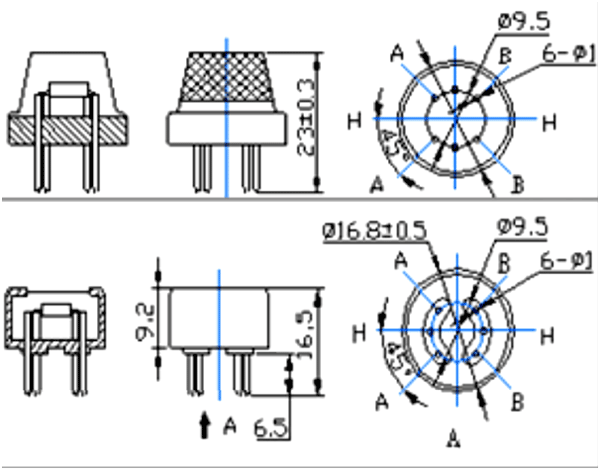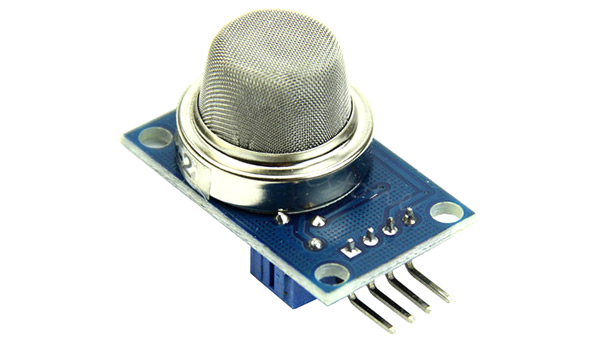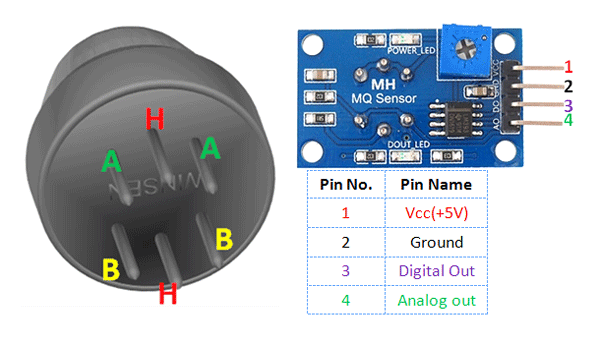MQ-6 Gas Sensor
Pin Configuration
|
Pin No: |
Pin Name: |
Description |
|
For MQ6 Sensor Module |
||
|
1 |
Vcc |
This pin powers the module, typically the operating voltage is +5V |
|
2 |
Ground |
Used to connect the module to system ground |
|
3 |
Digital Out |
You can also use this sensor to get digital output from this pin, by setting a threshold value using the potentiometer |
|
4 |
Analog Out |
This pin outputs 0-5V analog voltage based on the intensity of the gas |
|
For MQ6 Sensor |
||
|
1 |
H -Pins |
Out of the two H pins, one pin is connected to supply and the other to ground |
|
2 |
A-Pins |
The A pins and B pins are interchangeable. These pins will be tied to Supply voltage. |
|
3 |
B-Pins |
The A pins and B pins are interchangeable. One pin will act as output while the other will be pulled to ground. |
Features of MQ6 Gas sensor
- Operating Voltage is +5V
- Can be used to detect LPG or Butane gas
- Analog output voltage: 0V to 5V
- Digital Output Voltage: 0V or 5V (TTL Logic)
- Preheat duration 20 seconds
- Can be used as a Digital or analog sensor
- The Sensitivity of Digital pin can be varied using the potentiometer
Note: Complete technical details can be found in the MQ6 Gas Sensor Datasheet linked at the bottom of this page.
Alternative MQ6 Gas sensors
|
Sensor Name |
Gas to measure |
|
Methane, Butane, LPG, Smoke |
|
|
Alcohol, Ethanol, Smoke |
|
|
Methane, CNG Gas |
|
|
MQ-5 |
Natural gas, LPG |
|
MQ-6 |
LPG, butane |
|
MQ-7 |
Carbon Monoxide |
|
Hydrogen Gas |
|
|
MQ-9 |
Carbon Monoxide, flammable gasses |
|
MQ131 |
Ozone |
|
Air Quality |
|
|
MQ136 |
Hydrogen Sulphide gas |
|
Ammonia |
|
|
MQ138 |
Benzene, Toluene, Alcohol, Propane, Formaldehyde gas, Hydrogen |
|
MQ214 |
Methane, Natural Gas |
|
MQ216 |
Natural gas, Coal Gas |
|
MQ303A |
Alcohol, Ethanol, smoke |
|
MQ306A |
LPG, butane |
|
MQ307A |
Carbon Monoxide |
|
MQ309A |
Carbon Monoxide, flammable gas |
MQ6 Equivalent Sensors
MQ-2, MQ-5, AQ-2, MQ-306A, AQ-3
Where to use MQ-6 Gas sensor?
The MQ-6 Gas sensor can detect or measure gases like LPG and butane. The MQ-6 sensor module comes with a Digital Pin which makes this sensor to operate even without a microcontroller and that comes in handy when you are only trying to detect one particular gas. When it comes to measuring the gas in ppm the analog pin has to be used, the analog pin also TTL driven and works on 5V and hence can be used with most common microcontrollers.
So if you are looking for a sensor to detect or measure gasses like LPG, or methane with or without a microcontroller, then this sensor might be the right choice for you.
How to use MQ-6 Sensors to Detect gas?
Using a MQ sensor it detect a gas is very easy. You can either use the digital pin or the analog pin to accomplish this. Simply power the module with 5V and you should notice the power LED on the module to glow and when no gas it detected the output LED will remain turned off meaning the digital output pin will be 0V. Remember that these sensors have to be kept on for pre-heating time (mentioned in features above) before you can actually work with it. Now, introduce the sensor to the gas you want to detect and you should see the output LED to go high along with the digital pin, if not use the potentiometer until the output gets high. Now every time your sensor gets introduced to this gas at this particular concentration the digital pin will go high (5V) else will remain low (0V).
You can also use the analog pin to achieve the same thing. Read the analog values (0-5V) using a microcontroller, this value will be directly proportional to the concentration of the gas to which the sensor detects. You can experiment with this values and check how the sensor reacts to different concentration of gas and develop your program accordingly.
How to use MQ-6 sensor to measure PPM?
If you are looking for some accuracy with your readings then measuring the PPM would be the best way to go with it. It can also help you to distinguish one gas from another. So to measure PPM you can directly use a module. A basic wiring for the sensor from datasheet is shown below.
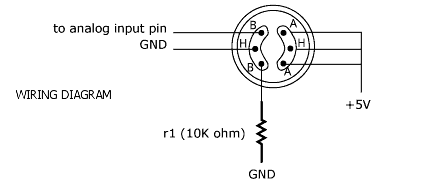
The procedure to measure PPM using MQ sensor is the same but few constant values will vary based on the type of MQ sensor used. Basically we need to look into the (Rs/Ro) VS PPM graph given in the MQ-6 datasheet, and also shown below.
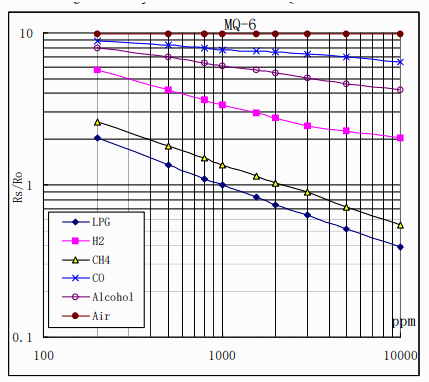
The value of Ro is the value of resistance in fresh air and the value of Rs is the value of resistance in Gas concentration. First you should calibrate the sensor by finding the values of Ro in fresh air and then use that value to find Rs using the formulae:

Once we calculate Rs and Ro we can find the ratio and then using the graph shown above we can calculate the equivalent value of PPM for that particular gas.
Applications
- Detect or measure Gases like LPG, and butane
- Air quality monitor
- Gas leak alarm
- Safety standard maintenance
- Maintaining environment standards in hospitals
2D model of MQ-6 Gas sensor
If you purchased as sensor then you can use the following dimensions to create your own PCB for your application
